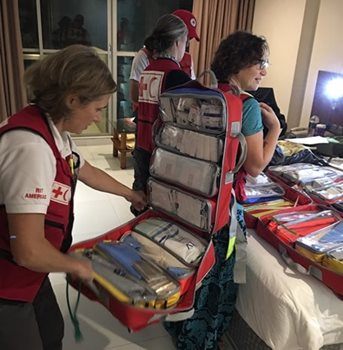As the saying goes, necessity is the mother of invention. In the humanitarian sector, particularly in emergencies, innovations often come about in response to a specific challenge that forces organizations like the Canadian Red Cross to adapt and change processes.
But innovation isn’t simply something that happens out of necessity. It’s in fact part of our overall strategy at the Canadian Red Cross, so we can most effectively respond to crises in a changing world. Innovation is supported at the Red Cross through improved collaboration and information sharing, essentially, creating a space where innovations can flourish.
“Sometimes ideas are identified, tested and scaled systematically through internal ‘pipelines,’ while others are discovered and implemented more organically,” explains Peter Potsepp, Senior Manager, Innovation and Systems at the Canadian Red Cross.
Innovating to provide healthcare in camps in Bangladesh
In Bangladesh, where over 600,000 people have settled in makeshift camps in Cox’s Bazar after escaping violence in neighbouring Rakhine State, Myanmar, the challenges facing humanitarian aid workers are numerous. Imagine if a city the size of Brampton popped up over the span of a few months without the infrastructure required for people to survive such as shelter, food, water, sanitation and healthcare. That’s the situation in these camps.
When the Canadian Red Cross, with support form the Government of Canada, deployed its mobile health clinic and staff to Bangladesh, it quickly became apparent that the most vulnerable people were located in sites that were not accessible by road, only by footpath in hilly terrain.

The team identified a need to make the most critical components of the mobile clinic transportable by foot. It’s already designed as a modular system that can be deployed in a number of different configurations to suit needs in different types of emergencies.
The mobile health team further divided and prioritized supplies into medical packs they could carry on their backs in order to bring services to the farthest reaches of the expanding settlements in Cox’s Bazar. The Canadian Red Cross will evaluate how this new configuration could be used in the future.
While mobile data collection has been used by the Canadian Red Cross for many years, it has proven especially useful in Bangladesh when applied in a new way, to implement emergency health surveillance in spontaneous settlements.
Using Magpi software, the Red Cross team collects information on health issues such as nutritional status on mobile devices whether they are connected or (more often) not connected to the Internet at the time of data collection. The information is collected in a format that is easy to analyze for trends and is available in real time in a dashboard and accessible to different teams who need it to make decisions to tailor and adapt health services.
Over time, innovations such as these become the standard in emergency responses around the world, such as the system used to distribute relief items in Bangladesh, as described by Canadian Red Cross CEO Conrad Sauvé in this short video.
Social Innovation Challenge
If you’re interested in coming up with ideas to improve the humanitarian response to the crisis in Bangladesh, register to participate in our Social Innovation Challenge. Teams of 3-5 people (ages 18-30) from all backgrounds and experiences are invited to take part. The event will take place January 27 in Vancouver, Calgary and Toronto, as well as online.
Sign up and learn more about the Social Innovation Challenge.